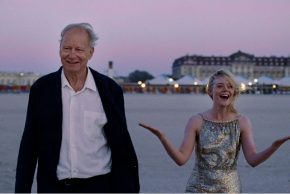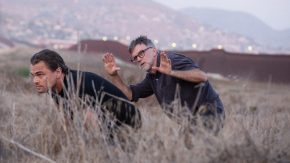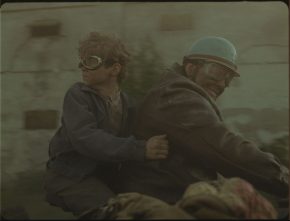“A gay fantasia on national themes”
This is the subtitle of Pulitzer-awarded play Angels in America. Still actual in today’s Hungary, the way majority society treats gay people, or otherness in general, no matter that Tony Kushner’s original play on “the state of American nation” in context of racial, religious, political and social questions was written more than thirty years ago. Since then, this work, speaking about tabooised same-sex love and AIDS, is already taught at school in the USA. Its opera version is world famous composer and conductor Péter Eötvös’s work. Premiered in 2004, it has been played from New York through Hamburg to London, but never in Hungary. Its Budapest premiere will happen on the 10th of October as part of the CAFe Budapest Contemporary Arts Festival, together with the Neue Oper Wien.
As I said, the subtitle really couldn’t be more actual – I just have to recall a 19-year-old girl brutally beaten up because she had a rainbow tote bag at an event. Her father’s friend who came to help also got his zygoma broken while he was trying to fend off the attack of homophobic boneheads. I can still remember her swollen face with the bruises.
I also remember a scene, some days before the mentioned attack, in a bus station. A photographer took pictures of a Coca-Cola billboard, depicting a gay couple, damaged with airbrush. (The company’s advertisement campaign #loveislove was withdrawn in Hungary due to right-winged criticism. An MP of the ruling party Fidesz even called for boycott of Coca-Cola products.)
Symbolic scenes from contemporary Hungary – both show how much otherness is still hated and despised by a large part of society.
Angels in America, apart from its political, racial and religious questions, also deals with acceptance of ourselves and others, fondness for life, and facing death.
With hallucination against the deadly illness
Kushner wrote the two-part piece in 1988. Its first part (Millennium Approaches) was premiered in 1991, the second (Perestroika) a year later. It had its Broadway debut as a two-part show in 1993.
The story is set in New York in the 1980s. Kushner wrote it for eight actors and actresses who play two or more roles, sometimes impersonating someone of a different gender.
The plot is complex, full with surreal dreams, metaphoric hallucinations, and revelations. The protagonist is Prior Walter, a gay man suffering from AIDS, who thinks an angel is sending him messages, wanting him to be a prophet. Prior wants to save the whole world, which gives him strength to fight the illness.
When Prior’s illness is revealed, his partner Louis leaves him and starts a relationship with Mormon Joe Pitt. The latter divorces his valium-addicted wife for a man’s love.
Prior’s only supporter is his former love, Belize a black ex-drag queen who became a nurse. He also cares for Roy Cohn, a lawyer who denies his homosexuality but is also affected by AIDS. Cohn is Joe Pitt’s boss, and he really existed – he was the prosecutor who sent the Rosenbergs to death. (Julius and Ethel Rosenberg’s execution by electric chair was a great scandal of their time. They were found guilty of spying for the Soviets, but it’s still not sure whether this is true or they were innocent. People like Einstein, Picasso, Cocteau, Brecht, Sartre and Pope Pius XII protested against their execution.)
Roy Cohn, both a horribly corrupt person and a moribund, is haunted by Ethel Rosenberg’s ghost. In his last minutes, he talks to her, believing that the dead woman is his mother who helps him to the afterworld with a kaddish lullaby to release him from suffering.
At the end of the play, Prior is set free from his obsession and quits acting like a prophet. With Louis, Belize and Hannah (Joe Pitt’s mother), they are discussing the collapse of the Soviet Union at the Bethesda Fountain in the Central Park.
Agonizing but not dying
It was hard work for Eötvös and his wife, libretto writer Mari Mezei to create a 2,5-hour long opera from the 7,5-hour long drama. Mezei has worked on the text for months, cutting a bit of the original political connotations and focusing more on the individual fates of the characters. Eötvös says that leaving actual politics out was the only thing Kushner critiqued when they met in Paris, by the time the HBO miniseries Angels in America was shot there. (It received 11 Emmy awards.)
Eötvös, handpicked by Zoltán Kodály at the age of 14 to study at the Academy of Music, states that what he founds the most miraculous is world saver Prior’s love of life – he might agonize but he doesn’t want to die. The composer, before creating music that unites characteristics of musical, jazz, and rock, went to New York theatres’ musical programmes with his wife for two weeks.
In 2004, his opera, requested by the Théâtre du Châtelet Paris, was a major success. Same in London, New York, Boston, Los Angeles, and Hamburg.
Although the world famous opera version debuts in Hungary in a few days, audience could already see Tony-awarded Kushner’s original play in the Comedy Theatre (the first part in 1993, directed by Péter Rudolf) and in the National Theatre (under Róbert Alföldi’s era in 2012).
Angels in America, just like Eötvös’ previous piece Paradise Reloaded (Lilith) can be seen as a coproduction with Austrian Neue Oper Wien on the 10th and 12th October in the Müpa. Directed by German director Matthias Oldag, featuring Eötvös himself as conductor.
Three weeks later, on the 31th of October, Eötvös gives another concert at the same place with the National Philharmonic Orchestra. Martin Grubinger is going to beat percussions on the rhythm of Sándor Weöres’ babbling poems – Péter Eötvös wrote Speaking Drums exclusively for the Austrian drummer. We can also hear zeroPoints, debuted in 1999 in London, and Per Luciano Berio, composed in 2003 but only orchestrated fifteen years later. For Eötvös’ special request, the show also includes the Dante Symphony by Franz Liszt.
Article: Réka Barcza
Translation: Zsófia Hacsek

























Comments